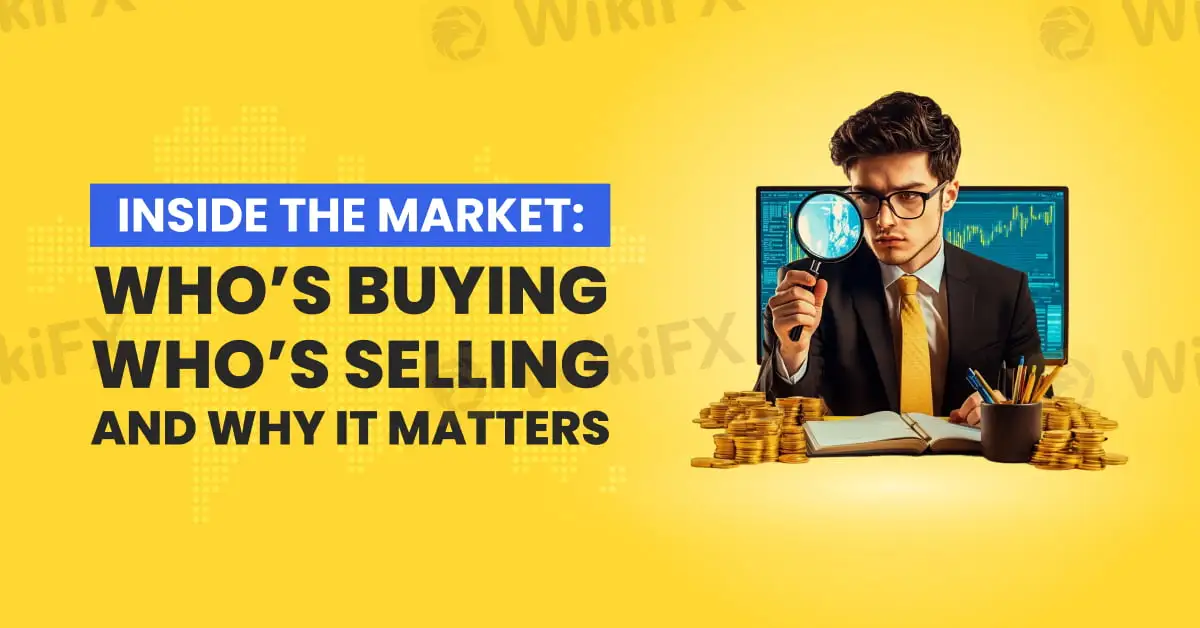简体中文
繁體中文
English
Pусский
日本語
ภาษาไทย
Tiếng Việt
Bahasa Indonesia
Español
हिन्दी
Filippiiniläinen
Français
Deutsch
Português
Türkçe
한국어
العربية
Inside the Market: Who’s Buying, Who’s Selling, and Why It Matters
Abstract:Understanding who takes part in the financial markets is key to knowing how and why prices move. Knowing who these people or organisations are can help investors feel more confident and better understand the effects of global news on market movements.

Understanding who takes part in the financial markets is key to knowing how and why prices move. Each trade, whether big or small, happens because someone is buying while someone else is selling. Knowing who these people or organisations are can help investors feel more confident and better understand the effects of global news on market movements.

One of the largest and most powerful groups in the market is the interbank market, made up of major commercial banks and securities firms. These institutions are responsible for around 40% to 50% of all foreign exchange trading worldwide. Because they trade such large volumes, they benefit from the lowest transaction costs, or “spreads”, in the market. Their size and influence put them at the top of the financial trading world.
Another major player is the central bank. Central banks manage a countrys money supply, interest rates, and inflation. They also hold large amounts of foreign currency, which they use to keep their local economies stable. Their involvement in the market is not for profit but for national economic stability, which gives them a strong presence in the foreign exchange world.
Investment management companies also play a key role. These firms handle large amounts of money on behalf of clients, such as individuals, companies, or pension funds. When they invest in foreign assets, they need to buy and sell different currencies to complete those deals. While part of their activity is based on practical needs, many also trade currencies to take advantage of market trends and try to earn profits.
The market also includes a growing number of retail traders, that is, individual investors who use banks or online brokers to make trades. Their trades are usually small and focused on speculation rather than actual currency exchange. They do not take physical delivery of money but instead try to earn from price changes. Even though they are smaller players, their combined actions can still affect the market, especially during periods of high activity.
Finally, there are non-bank foreign exchange companies. These firms help people and businesses move money across borders or exchange currencies for everyday needs. Unlike banks, they do not trade for speculation. Their customers often need to receive or send money in different currencies, so the transactions involve the physical delivery of funds. They serve an important role, especially in global trade and personal finance.
Each of these groups, from powerful banks to everyday individuals, plays a unique part in keeping the financial markets running. By understanding who they are and what drives them, traders and investors can make more informed decisions and better navigate the complex world of finance.

Disclaimer:
The views in this article only represent the author's personal views, and do not constitute investment advice on this platform. This platform does not guarantee the accuracy, completeness and timeliness of the information in the article, and will not be liable for any loss caused by the use of or reliance on the information in the article.
Read more

IronFX UK 2024 Revenue Doubles to $1.44 Million
In 2024, IronFX UK saw its revenue double to $1.44 million, maintaining profitability despite rising administrative costs. The company attributed the growth to a stronger UK client base and remains optimistic about future cost optimization. Meanwhile, founder Markos Kashiouris expands into prop trading, signaling broader ambitions.

Former Alpari Executive Appointed CCO, Accelerating GTCFX’s Global Expansion
GTCFX has made a major personnel move! A seasoned former executive from Alpari has officially joined the firm, drawing widespread attention and signaling that GTCFX may be entering a new phase of rapid international growth.

NVIDIA Earnings Incoming: Alpari’s Insights Ahead of the Curve
As NVIDIA’s earnings approach, Alpari offers its forecast on potential market reactions, suggesting that this event could be a key variable in moving U.S. equity markets.

Deriv Appoints Rakshit Choudhary as CEO, Leading a New AI-Driven Chapter
As artificial intelligence reshapes the financial world, global trading platform Deriv has taken a bold step by naming Rakshit Choudhary as its new CEO. The appointment marks a leadership transition and signals the company’s firm commitment to an AI-first strategy for future growth.
WikiFX Broker
Latest News
Capital.com Reports Strong Growth and Leadership Changes
India GDP: Growth at 7.4% faster than expected in fourth quarter
NinjaTrader Fined $250,000 for Anti-Money Laundering Lapses
OANDA Fined $600K by NFA Over Rule Breaches and Crypto Claims
Key Figure Behind $230 Million Crypto Fraud Arrested After Two Years on the Run
SEC Drops Lawsuit Against Binance in Major Crypto Enforcement Shift
MH Markets Broker Review
Use Leverage Like a Pro | Avoid the Mistakes That Wipe Traders Out
IG Group will no longer provide services in South Africa
Is GODO a Licensed Broker? Stop Guessing — Get the Facts, Now
Currency Calculator


